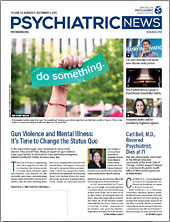A 20-year-old person who is gender nonconforming seeks treatment with a psychiatrist, and during the intake interview asks the psychiatrist whether he is experienced with trans patients. The psychiatrist has not counseled anyone through a gender transition before, though he is aware that two of his former adolescent patients subsequently identified as trans after their treatment had ended. The psychiatrist could choose to respond in a few ways: “I’ve never treated someone going through a transition before, so I’m not sure I’m qualified to help you” or “I’ve treated a few people who later transitioned, so I’m quite familiar with the issues.” Which is better?
There is value in reassuring a patient that we are experienced in the treatment of their particular condition. A physician’s confident reassurance is itself therapeutic. Particularly at the beginning of treatment, psychiatrists are focused not only on making an accurate diagnosis and devising an effective treatment plan but also on forging an alliance with the patient. It is easier for the patient to trust the psychiatrist’s opinion about what is wrong and how to address it if the psychiatrist speaks with authority. Part of medical training is learning that saying “I don’t know” is an even worse answer than a wrong answer as it may signal a weak intellect or insufficient self-assurance to the patient.
However, declarations of expertise can veer into arrogance if not tempered by humility. Those who have devoted their careers to one particular diagnosis or intervention may claim truthfully to be experts. For the rest of us, how much experience do we need in a particular condition to claim expertise?
Approximately 2,500 years ago, Confucius identified humility as the foundation of all virtues. The 20th-century Christian theologian Ralph Washington Sockman said, “True humility is intelligent self-respect which keeps us from thinking too highly or too meanly of ourselves.” Notice that humility doesn’t mean self-debasement; rather, it means right-sizing our confidence so that it takes up an appropriate amount of space—neither too large nor too small.
What are the obstacles to honest humility? In addition to the aforementioned medical training—to speak with authority even if unsure of the answer—psychiatrists may have financial or systems’ pressures to accept all new patients who present for care and thus may not pause to consider whether they are able to provide expert treatment. Or, some psychiatrists may have a keen interest in seeing a new type of patient despite their lack of expertise in that area and so may assure the patient that they are able to provide care without disclosing their inexperience.
The Principles of Medical Ethics With Annotations Especially Applicable to Psychiatry includes the following statement in Section 2, Article 3: “A psychiatrist who regularly practices outside his or her area of professional competence should be considered unethical.” That is not to say that psychiatrists can’t stretch beyond the bounds of their customary areas of competence, as long as we also heed the admonition in Section 5, Article 1: “Psychiatrists are responsible for their own continuing education and should be mindful of the fact that theirs must be a lifetime of learning.”
If we apply the virtue of humility to the case scenario, the psychiatrist could truthfully reveal his lack of expertise while also demonstrating an interest in expanding his competence. It might sound like this: “I’ve never treated someone going through a transition before, but I’m willing to educate myself.” This response also supports the principle of autonomy because it lets the patient know the limits of the psychiatrist’s experience and reveals something about his character. From here, the patient is better able to make an informed decision about his or her treatment. ■

